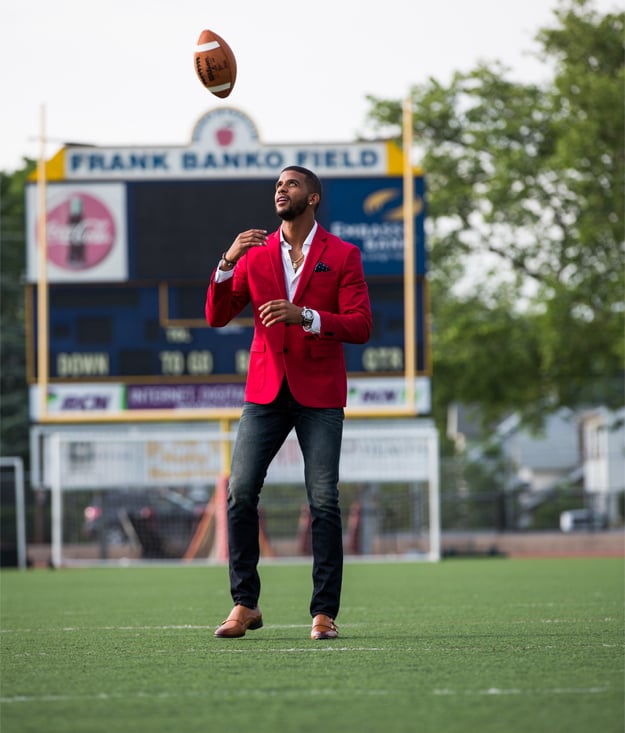
They don't originate from here all that often—titans of the gridiron who play pee-wee and high school ball in the Valley and go on to be picked up by a marquee team like the Dallas Cowboys. But Devin Street, once a Liberty High School Hurricane, can say he did it.
Street, a wide receiver, now knows what it takes to play football on a professional level; he knows it takes grit, guts and hard work. While growing up and playing in Bethlehem's youth football organizations, Street told his mother at the age of eight that he was going to play in the NFL. He loved the competitive nature of the game and the chance to be aggressive while playing.
Street is in the midst of his second season for the Dallas Cowboys, following successful tenures at the University of Pittsburgh and Liberty High School in Bethlehem.
“Everyone always doubted me. I wanted to prove them wrong and make it to the NFL,” he says during a recent interview. “Football is a challenging sport. Mentally or physically... every day is a test [of your] willingness and determination.”
Toughing it Out
Fortunately, Street had athleticism in his blood. His father, Ted Street, ran track and played football at Kutztown University. The elder Street was a big influence on his son especially when it came to training and practicing. That influence remains with Devin today. “There will never be a coach that will be tougher,” Street says of his father. “He prepared me for [the doubters].”
Street explains that along with influence came expectations—expectations almost to the point that nothing was ever good enough. While that was hard for Street to handle as a kid, he says it prepared him tremendously for a future on the gridiron.
“I hold myself to that standard now,” Street says. “Maybe a little too much.”
Street says those early lessons came in handy when tough situations like dropping a ball or playing through an injury inevitably happened. He knew he just needed to get back out there again and push the limits.
When Street started playing at the high school level, he wasn't given a starting position right away. There was doubt surrounding him on the field, and Street notes that he was never the strongest player.
“But I was fast and felt smart,” he says, adding that he wanted to prove it to himself that he could do well in the sport.
Despite his positive attitude, Street says he didn't see much playing time until his senior year in high school. That, he says, taught him patience, and he would need that again as a Panther at the University of Pittsburgh. During his freshman year, Street was “red-shirted,” or held back from playing so he could practice more and further develop his skills. The time away from the field allowed Street, while waiting for his chance to shine, to work on the fundamentals of the game and all the other elements he would need to be successful.
He would play his first game the following season as a sophomore. Street became a major contributing player starting in 2010 playing all 13 games with 25 catches and two touchdowns to his credit. He continued to be a major contributor through 2013. According to the university's athletic website, Street had 53 catches and two touchdowns in 2011, despite suffering a concussion that year.

Butting Heads
Injuries are known to happen in football and Street is no stranger to them. He says the NFL and other sports organizations across the country do a great job treating players for their injuries, including concussions. The coaches and staff, Street says, are aware of the repercussions that can happen when injuries aren't taken seriously or are mishandled. But, Street says, this all comes with the territory.
“You are human at the end of the day,” he says. “For them to pay attention to it... they do it the right way. At the same time, it's part of the game. You sign up for it. You have to be aware [of it].”
Street says those diagnosed with a concussion have to be properly treated and make a full recovery to be cleared to come back in the game, like he was when he entered his third season in 2012. That season, Street caught 73 passes, scored five touchdowns and was selected to the All-Big East second team.
During his final season at Pittsburgh in 2013, Street finished the season as the all-time leading receiver in school history with 202 career receptions, despite playing just 10 games due to two separate injuries.
Street's final year included his favorite college game, in which he and the Panthers went up against the University of Notre Dame. “We had a history throughout my four years there,” Street explains, adding the Panthers had beaten Notre Dame during his freshman year, but lost during his sophomore and junior years. Street's squad played “a hell of a game” against Notre Dame during that senior year victory, he says.
Life in Dallas
Street, who majored in economics and communications while at Pitt, was the sixth pick in the fifth round of the 2014 NFL draft.
During Street's first season with the Cowboys, the team finished the 2014-15 regular season with a record of 12-4. Street's rookie season found the 24-year-old wide receiver advancing with the Cowboys to the NFC playoffs, where they beat the Detroit Lions before being eliminated by the Green Bay Packers.
On a personal level, Street says his goals were set a lot higher going into the season. “I had to embrace my role and perform to keep my job,” he says.
Looking forward to this season, Street hopes to have a bigger role on the team and to become a more valuable and productive member of the offense. He says he hopes to build the trust necessary for team members to know that they can count on him when it comes to making plays. “I'm looking forward to getting back at it again and going to war against those other teams,” Street says.
Playing and practicing alongside the bigger names in the sport, such as Tony Romo, DeMarco Murray and Dez Bryant, doesn't intimidate Street, nor does playing against opponents from other teams. Street says he studies hours of game tape trying to envision himself in those particular scenarios and thinking about how he would handle them.
“I'm more motivated and [hungrier] to go against guys like that,” he says about preparing for games.
It was a blessing that he went to what he describes as a great team and organization. Street says he loves the coaching staff and the strength and conditioning tasks. (The Cowboys' practice facilities are located in Valley Ranch, Texas. The team's stadium is located in Arlington, though the Cowboys are scheduled to relocate to Frisco, Texas in 2016.)
Being in Texas is a climate change for Street, who is used to Pennsylvania weather. He says he embraces the very hot days in Texas and uses them to play fast. Street calls cold days in Texas “football weather” and relishes playing in it. Not everyone on the team shares his colder weather view, he says. Some team members, unaccustomed to cold weather, layer it on for practice. Street says he's comfortable sporting a T-shirt and shorts in cooler temperatures.

Normal Life
While some view the lives of professional athletes as flashy, Street says not all players drive around in Ferraris, go out to nightclubs or buy expensive jewelry. Most of his teammates, Street says, keep it simple and love to fish and hunt during their downtime.
“I lead a pretty normal life,” he says. “I'm very eclectic in [my] style. It's all what I'm feeling that day.”
Street's style ranges from wearing all black and leather to a cardigan with Bermuda shorts and loafers. He equates his style to his taste in music, which bounces from heavy metal to jazz and country. Street's time away from the field involves, but is not limited to, reading historical non-fiction, The Wall Street Journal and the regional Real Estate Digest.
Being a member of the NFL has its advantages, Street says, and he feels being able to give back is one of them. “Especially the platform [we have],” he says.
Street, who was inspired to help others during a mission trip to Haiti in 2013, hopes to go back again soon to help build clean water systems and help out with other sustainable projects. “We're all on this earth to help each other,” he says. “Everyone could use a little help.”
In the meantime, Street plans on working hard to keep his job with the Cowboys. (Street finished his rookie year with two catches for 18 yards, playing in all 16 regular-season games.) He hopes to have a long career with the team, something rare in the professional sports world.
When Street gets the chance to come home, which is usually for short periods of time, he enjoys golfing, fishing and spending time with his younger brother, who is also an aspiring athlete.
Street says he gives his brother advice on what the journey to become a professional athlete is like, what is going to be expected of him and how to handle situations. “I just walked into it,” Street says of his own path to success. “I want to help him and put him on the straight and narrow.”
His advice to younger kids just starting out is to stay mentally tough, no matter what happens.
“Don't let anyone limit you or marginalize you,” Street says. “If you're cut from the team or lose in a game or drop a ball, come back from it.”
Well grounded, Street feels that everyone has a purpose and that you should embrace that purpose, but let go of the things that you can't control. His family remains significant in his life.
“I'm a mama's boy,” he says. “She still sees that little eight-year-old kid who said he was going to the NFL. It's refreshing that she [still] views me as her little boy.”
Reflecting on his time in football, Street says he has learned that nothing is guaranteed in life. He takes nothing for granted.
“It's a privilege to have a roof over your head. Nothing is going to be given to you in this world,” he says. “There is no substitute for hard work.”















